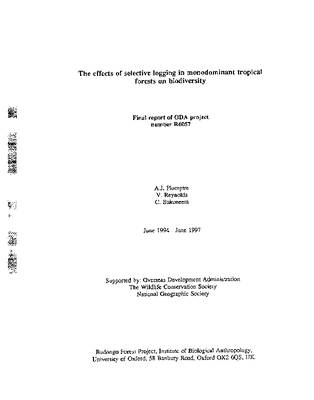The effects of selective logging in monodominant tropical forests on biodiversity. Final report of ODA project number R6057
KEYWORD: Community-based Natural Forest Management, Africa. Africa, Uganda, logging, biodiversity, conservation, forest reserve, regeneration, wildlife, monitoring, policy, research, case study, environmental assessment. SUMMARY: Budongo Plumptre.pdfResults are reported from of a three-year investigation of the impact of selective logging in monodominant forests on wildlife in Uganda. A previous ODA-supported project provided initial information on which the research was based. Observations took place in the Budongo Forest Reserve. Hypotheses were drawn from these observations and were tested in the Ituri forest, which is dominated by another species of tree. There were six objectives of the research: To determine causes of increased populations of primates in selectively logged areas; To extend this research to other animal species; To develop a model that would predict response of wildlife to changes in forest structure caused by logging; To collaborate with ongoing studies; To continue and expand seed dispersal research; and To continue and expand research on local chimpanzee populations. Methods and results are reported. The results indicated that primates and other frugivorous animals seemed to benefit from selective logging due to increased production of fruits by trees after the dominant trees had been removed. On the time scale in which this study took place, food availability had more of an impact on these populations than predation or disease. However, certain insectivorous birds declined after logging took place, which appeared to be due to changes in forest structure. Illegal timber harvesting also impacted forest regeneration. In conclusion, some species that are found in monodominant forests are positively impacted and others, including tree species, are negatively impacted by tree harvesting. To manage for species such as primates, some fruit trees should be left during logging. However, other species such as certain birds and trees have different requirements for their survival and this should be considered in policy, conservation and management decisions. Further research and monitoring of populations should be conducted.
https://biodiversitylinks.org/library/resources/rmp/library/content/tools/biodiversity-support-program/copy_of_cbnfm/USAID-BDB-cd-2-data/budongo-plumptre.pdf/view
https://biodiversitylinks.org/library/resources/rmp/library/content/tools/biodiversity-support-program/copy_of_cbnfm/USAID-BDB-cd-2-data/budongo-plumptre.pdf/@@download/image/image.png
File
The effects of selective logging in monodominant tropical forests on biodiversity. Final report of ODA project number R6057
Author(s):
Plumptre, A.J. , Reynolds, V. , Bakuneeta, C.
Publication Date: 1997
DOWNLOAD FILE
KEYWORD: Community-based Natural Forest Management, Africa. Africa, Uganda, logging, biodiversity, conservation, forest reserve, regeneration, wildlife, monitoring, policy, research, case study, environmental assessment. SUMMARY: Budongo Plumptre.pdfResults are reported from of a three-year investigation of the impact of selective logging in monodominant forests on wildlife in Uganda. A previous ODA-supported project provided initial information on which the research was based. Observations took place in the Budongo Forest Reserve. Hypotheses were drawn from these observations and were tested in the Ituri forest, which is dominated by another species of tree. There were six objectives of the research: To determine causes of increased populations of primates in selectively logged areas; To extend this research to other animal species; To develop a model that would predict response of wildlife to changes in forest structure caused by logging; To collaborate with ongoing studies; To continue and expand seed dispersal research; and To continue and expand research on local chimpanzee populations. Methods and results are reported. The results indicated that primates and other frugivorous animals seemed to benefit from selective logging due to increased production of fruits by trees after the dominant trees had been removed. On the time scale in which this study took place, food availability had more of an impact on these populations than predation or disease. However, certain insectivorous birds declined after logging took place, which appeared to be due to changes in forest structure. Illegal timber harvesting also impacted forest regeneration. In conclusion, some species that are found in monodominant forests are positively impacted and others, including tree species, are negatively impacted by tree harvesting. To manage for species such as primates, some fruit trees should be left during logging. However, other species such as certain birds and trees have different requirements for their survival and this should be considered in policy, conservation and management decisions. Further research and monitoring of populations should be conducted.



